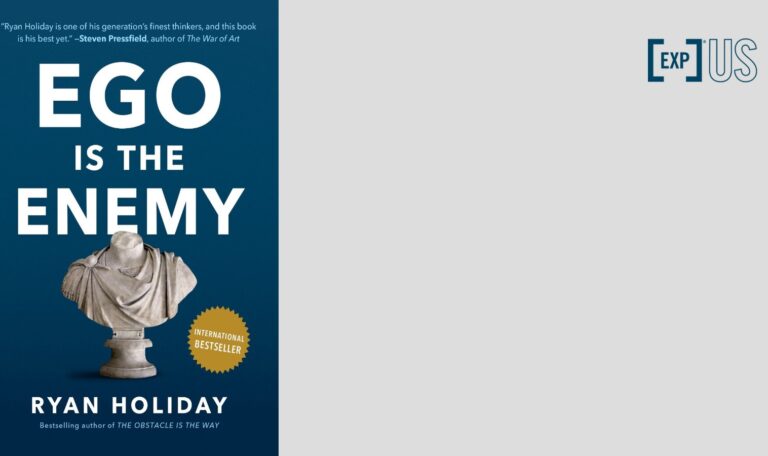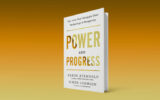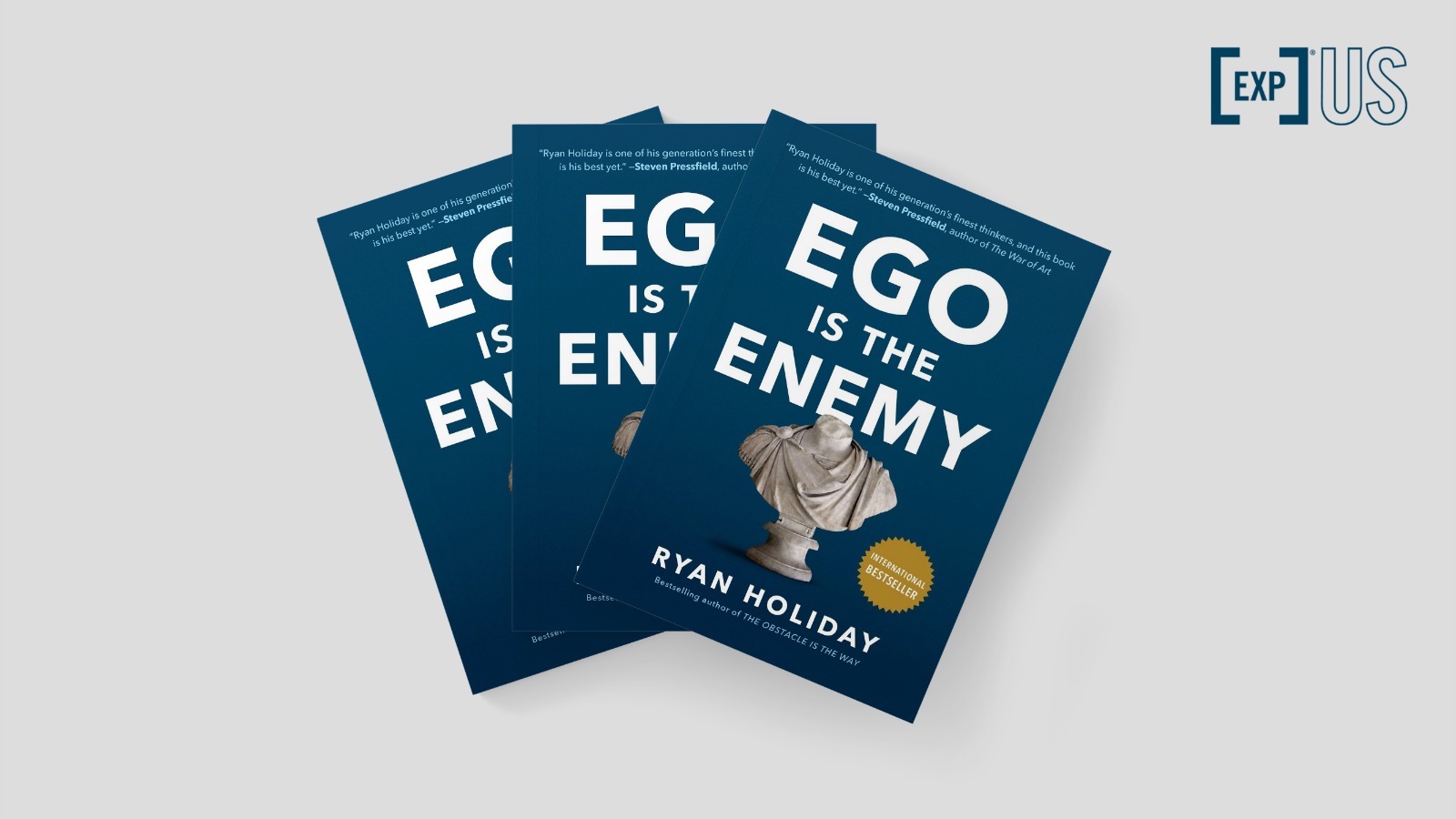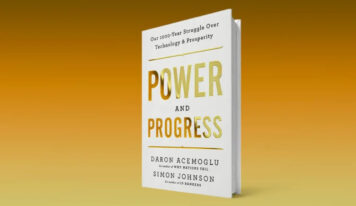How to master the unhealthy belief in one’s importance and prepare for moments of failure by cultivating strength and courage, in the view of one of the most revered authors among American soccer coaches
Central Ideas:
1 – That’s the point of the blank canvas: achieve by helping others. Make a focused effort to trade short-term gratification for long-term compensation. Let others get credit on credit and you accrue interest on the principal amount.
2- Ego is your own worst enemy. It also hurts the people we love. Our families and friends suffer because of it. The same happens with our customers and fans. A critic of Napoleon was accurate when he said: “He despises the nation whose applause he seeks.
3 – It’s easy to have relentless ambition, anyone can step on the gas. Complacency is easy, just take your foot off the accelerator. We need to avoid what business management expert Jim Collins calls the “unbridled quest for more.”
4 – Be prepared. Misunderstandings and doubts may happen. Maybe your parents will never be impressed. Maybe your girlfriend won’t give a shit. Maybe the investor will not see the numbers. Maybe the audience won’t applaud. We cannot let this be our motivation.
5- For eight whole years, Churchill faced his short-sighted colleagues and the growing threat of fascism almost single-handedly, even in the West. But ultimately, he emerged triumphant once again. And he faced adversity again. And was, again, victorious.
About the author:
Ryan Holiday specializes in media manipulation, becoming the marketing director for a former American Apparel brand. The Obstacle is the Way, one of his published books, has been translated into 17 languages. He is revered among American soccer coaches.
Introduction
The ego to which we most often refer has a more casual definition: an unhealthy belief in one’s own importance. Arrogance. Self-centered ambition. This is the definition this book will use. It is that petulant child inside everyone, who prefers to do his wills above everything or anyone else. The need to be better than, more than, recognized by, far beyond any plausible utility – that is the ego. It is the sense of superiority and certainty that exceeds the limits of self-confidence and talent.
Pioneering CEO Harold Geneen compared egocentrism to alcoholism: “The egocentric does not stumble, knocking things off the table. He doesn’t stutter, he doesn’t drool. No; instead, he becomes more and more arrogant, and some people, not knowing what’s behind this attitude, mistake his arrogance for authority and self-confidence.” You could say that they begin to make this confusion themselves, not realizing the disease they have contracted or that they are killing themselves because of it.
The ways this separation negatively manifests itself are endless when we build walls. We cannot improve the world if we do not understand it or ourselves. We cannot accept or receive feedback when we are unable to listen to outside sources or have no interest in it. We cannot identify opportunities – or create them – if, instead of seeing what is before us, we live within our own fantasy. Without an accurate comparison between our abilities and those of others, what we have is not self-confidence, but an illusion.
So this book is organized into three parts: Aspiration, Success, and Failure.
The purpose of this structure is simple: to help smother the ego before bad habits take hold; to replace with humility and discipline the ego temptations that arise when we experience success; and to cultivate strength and courage, so that when fate turns against you, you will not be ruined by failure. In short, this framework can help us to be
Humble in our aspirations;
Generous in our successes;
Resilient in our failures.

PART I – ASPIRATION
Isocrates wanted his son to be “affable in his dealings with those who approach him, and never haughty; for even slaves find it hard to bear the pride of the arrogant” and “slow in deliberation, but quick in the execution of his decisions,” adding that “the best thing we have in us is good judgment. Constantly train your intellect, he instructed, “for the greatest thing in the smallest of compasses is a sound mind in a human body.”
Some of this advice may sound familiar since two thousand years later it reached William Shakespeare, who used to warn against unbridled ego. Using this same letter as a model in Hamlet, Shakespeare puts Isocrates’ words into the mouth of the character Polonius in a dialogue with his son Laertes. The speech, in case you are not familiar with it, ends with this short stanza:
And above all, be true to yourself
For then, like night and day
You can be false to no man.
Farewell. May my blessing mature this in you.
Shakespeare’s words, in turn, reached a young United States military officer named Tecumseh Sherman, who was to become perhaps the greatest strategist general in that country. He may have never heard of Isocrates, but he loved the play and numerous times quoted that very speech.
Benefiting from the great shortage of leadership, he was promoted to brigadier general and summoned to a meeting with President Lincoln and his top military advisor. On several occasions, however, Sherman displayed enough autonomy to layout strategies and plans directly with the president, but at the end of the trip, he made a strange request: he would only accept the promotion with the guarantee that he would not have to assume a higher position in the hierarchy. Could Lincoln give him his word on this? With all the other generals asking for the highest ranks and as much power as possible, the president gladly agreed.
His sense of reality allowed him to see a path through the South that the others thought impossible. His entire theory of maneuver warfare rested on the decision to deliberately avoid frontal assaults or demonstrations of force in the form of pitched battles, as well as to ignore criticism aimed at provoking a reaction.
What we see in Sherman is one man’s deep connection to reality. He was a man who came from nothing and accomplished great things, without ever considering the honors he received as his right. He usually ceded the honors to others and was more than happy to contribute to a winning team, even if it meant less credit or fame for himself.
Strategic flexibility is not the only benefit of silence while others chatter. So is psychology. The poet Hesiod had this in mind when he said, “A man’s greatest treasure is an economical tongue.” Speech exhausts us. Speaking and doing fight over the same resources. Research shows that after a while our mind begins to confuse it with progress itself.
Kirk Hammett looked for a guitar teacher. In other words, although he had joined his dream group and had become a professional, he insisted that he needed more instruction – that he was still an apprentice. The teacher he sought out was famous for being the master of masters and for having worked with musical prodigies such as Steve Vai.
Joe Satriani, the instructor, makes it clear what Hammett lacked – certainly not talent. “The main thing with Kirk (…) was that he was a very good guitar player when he arrived (…), he was already a soloist. He had a great right hand, he knew most of the chords, but he hadn’t learned to play in an environment that taught him all the names and he didn’t know how to connect everything.”
The power of being a great learner means not only an extended period of instruction but also putting ego and ambition in the hands of other people. A ceiling is imposed on the ego because the individual knows that he is no better than the “master” from whom he learns. You can’t “cheat” in an educational process, there is no other shortcut than to learn every day. If you don’t learn, you are out.
We don’t like to think that someone is better than us. Or that we still have a lot to learn. We want to think that we have reached the end of our learning. We want to be ready. We are busy and overloaded.
There is one thing these people have not told you: your passion may be exactly what keeps you from achieving power, influence, or success. For we often fail even with – or rather, because of – passion.
Passion often masks weakness. Its impetuosity, its frenzy, and its ability to take our breath away are mediocre substitutes for discipline, mastery, strength, purpose, and perseverance. You need to be able to identify these characteristics in others and yourself because while the origins of passion may be sincere and well-intentioned, its effects are comical and monstrous.
When someone gets their first job or joins a new organization, they are often given the following advice: help others build a good image, and you will do well. Put your head down, people say, and obey your boss. Of course, this is not what the young man, who was chosen among all the others for the position, wants to hear. It is not what a Harvard student expects – after all, he studied exactly to avoid this supposed indignity.
Let’s rephrase it so that the situation doesn’t seem so humiliating: the point is not to pull anyone’s bag. It is about providing the necessary support so that others can do well. The best way to express this advice is: to find blank canvases for others to paint on. Be a walking anti. Make a path for those above you, and you will eventually create your path.
That is the goal of the blank canvas strategy: to achieve success by helping others. Make a focused effort to trade short-term gratification for long-term compensation. While everyone wants to get credit and be “respected,” you can forget about credit. You can forget about it in such a way that you will be happy when others get it instead: that, in the end, is your goal. Let others receive credit on top of credit while you postpone receiving it and accumulate interest on the principal amount.
In other words, identify opportunities to foster the creativity of others, find ways and people to generate collaboration, and eliminate distractions that get in the way of their progress and focus. This is a rewarding power strategy and its scale is infinite. Consider every step investment in relationships and your development.
When Branch Rickey, the manager, and owner of the Brooklyn Dodgers, identified in Jackie Robinson the potential to be baseball’s first black player, he had one question: do you have the guts? “I’m looking,” Rickey told him, “for a baseball player brave enough not to react.” In fact, in their famous meeting, Rickey simulated the insults Robinson was likely to suffer if he accepted the proposed challenge: a hotel manager refusing to give him a room, a rude waiter in some restaurant, an opponent shouting insults. Robinson assured him that he was ready to deal with it. Rickey could have chosen many players, but he needed someone who would not let ego prevent him from seeing the big picture.
When he started on baseball’s grassroots teams, then moved on to the pros, Robinson faced more than just the scorn of service providers. There was an aggressive, coordinated campaign to defame him, to attack him. Yet Jackie Robinson kept the verbal pact made with Rickey.
Pride takes an unimportant achievement and makes it look like a great accomplishment. It delights in our supposed cleverness and talent as if what we have already exhibited is but a vague idea of what is to come.
Pride and ego say:
I am an entrepreneur because I started on my own.
I’m going to win because, at the moment, I’m ahead.
I’m a writer because I published something.
I am rich because I made some money.
Every culture seems to produce words that warn against this. Don’t count on the egg that the hen has not yet laid. Don’t put the cart before the horse. Don’t throw firecrackers before the party.

PART II – SUCCESS
If one were looking for a poignant metaphor for ego and destruction, one would be hard-pressed to find anything better than the image of someone working furiously with one hand toward a goal and the other hand straining equally hard to sabotage it.
Like all of us, Howard Hughes was neither completely crazy nor completely sane. His ego, fed and exacerbated by physical ailments (mostly from plane and car crashes caused by himself) and various addictions, led him into a darkness that is very hard for us to understand.
Success is intoxicating. However, its maintenance requires sobriety. We cannot keep learning if we think we already know everything. We cannot let ourselves be carried away by the myths that we have created, or by the noise and chatter of the outside world. We need to understand that we are but a small part of an interconnected universe. Above all, we need to build an organization and a system around what we do – whose focus is on the work, and not on ourselves.
This is Hughes’ verdict: he has been destroyed by ego. A similar judgment awaits us at some point. Throughout your career, you will be faced with the same choices that he had to make – that all people must make.
When we obtain our first achievements, we surprise ourselves with new problems. The newly-promoted soldier must learn the art of politics. The merchant, to manage. The creator, to delegate. The writer, to edit others. The comedian, to act. The chef who becomes a restaurant owner manages the other side of the house.
It gives a chill to think of the life forces being sucked out of this hero, defeated and in agony. A man of integrity and honesty, who simply could not keep his focus and ended up too far beyond the limits of his immense genius. Not that [General] Grant was the only one to go through this. We all regularly say “yes” without thinking, whether out of a vague attraction, greed or vanity. Because we can’t say “no” – because if we do, we might lose something.
It doesn’t matter whether you are a billionaire, a millionaire, or just a kid who got a good job early. The total and absolute self-confidence that got you this far can become a big risk if you are not careful. Do you know the longings and dreams you had about a better life? And the ambition that fueled your efforts? They start as legitimate motivations, but if they are not controlled, they become overconfident and arrogant.
Ego is its own worst enemy. It also hurts the people we love. Our families and friends suffer because of it. The same happens to our customers and fans. One critic of Napoleon could not have been more accurate in stating, “He despises the nation whose applause he seeks.” Napoleon could not see the French in any other way but as pieces to be manipulated, people towards whom he needed to be better, people, who, if they did not support him completely and unconditionally, were against him.
An intelligent person must always remember the limits of his power and reach.
After a team starts winning victories and gaining media attention, the simple bonds that are used to unite individuals begin to break down. The players calculate their importance. Their chests inflate. Frustrations arise. Egos emerge. The “Innocent Climb,” according to Pat Riley, is almost always succeeded by the “Disease of the Self. It can “strike any winning team in any year at any time,” and it happens with alarming regularity.
Marshall was tested in this respect to his limit. The position he had spent his life fighting for was now within his grasp: command of the troops on D-Day, essentially the greatest coordinated invasion the world had ever seen. Roosevelt made it clear that the command would be Marshall’s, he just had to want it. A general’s place in history is earned by his achievements in battle. Therefore, although Marshall was needed in Washington, Roosevelt wanted to allow him to take command. Marshall would not accept. The task and the glory went to Eisenhower.
There is a balance. Soccer coach Tony Adams expresses this very well, “Play by the name on the front of the jersey,” he says, “and people will remember the name on the back.”
Why do you think the great leaders and thinkers throughout history “leaped into the vastness” and came back inspired, with a plan, with an experience that set them on a course that ultimately changed the world? It was because, in doing so, they found perspective, understood the big picture in a way that was possible in the hustle and bustle of daily life. By silencing the noise around them, they could finally hear the whispering voice they needed to hear.
Creativity is a matter of receptivity and recognition. It cannot happen when you are convinced that the world revolves around you.
Chancellor Angela Merkel is sober, while many leaders are intoxicated – with ego, power, position. This sobriety is precisely what has made her a very popular leader already serving her third term [already finished] and still a powerful, sweeping force for freedom and peace in modern Europe.
It is easy to have relentless ambition, anyone can step on the accelerator. Complacency is also easy, it’s a matter of taking your foot off the accelerator. We need to avoid what business management expert Jim Collins calls the “undisciplined pursuit of more,” as well as the complacency that comes with applause. Borrowing Aristotle’s ideas, what is difficult is applying the right amount of pressure, at the right time, in the right way, for the right amount of time, to the right car, and going in the right direction.

PART III – FAILURE
We all deal with setbacks along the way. The ego not only prevents us from preparing for these circumstances but often contributes to their occurrence. The way out, the way to resume progress, requires reorientation and more self-knowledge. We need no pity – not for ourselves or for anyone else. We need purpose, balance, and patience.
If reading that list of [Graham’s] problems is exhausting enough, imagine living them. Yet, thanks to Graham’s perseverance, the results were better than anyone could have predicted.
The leaked documents published by Katharine Graham were known as the Pentagon Papers and became one of the most important events in the history of journalism. The Post’s coverage of Watergate that so infuriated the Nixon White House changed American history and brought down an entire administration. It also earned the paper a Pulitzer Prize. The investor that others feared so much, in the end, was a young Warren Buffet, who became Graham’s mentor in business as well as a great advocate and steward of the company. (His small investments in Graham’s family’s company would one day be worth hundreds of millions.)
Graham did not cause her husband’s suicide, but she needed to move on without him. She didn’t ask for Watergate or the Pentagon Papers, but it was up to her to get through his incendiary nature. While others plunged into outbreaks of buyouts and mergers in the 1990s, Katharine did not follow the trend. Instead, she focused on herself and the company itself, despite Wall Street seeing it as a fragile company. She had the chance to take the easy way out several times, but that is not what she did.
Malcolm faced what Robert Greene – a man who sixty years later would have his extremely popular books banned in many federal prisons – calls the “Live or Dead Time” scenario. What, after all, would those years of incarceration be like? What would Malcolm X do with that time?
As he would later say, “From then until the day I got out of prison, every free time I had, if I wasn’t reading in the library, I was reading in my bunk.” He studied history, sociology, religion, read the classics, philosophers like Kant and Spinoza. Later, a reporter asked Malcolm, “What university did you attend?” He gave one word as his answer, “Books.” The prison was his college.
Historians, scholars, and artists have spent centuries lamenting and discussing the treatment Belisarius received. Like everyone with a sense of justice, they are outraged by the stupidity, the ingratitude, and the injustice to which this great and unusual man was subjected.
Do you know who was the only person who never complained about this? Not once until the end of his life, not even in personal letters? Belisario himself. He knew he had done the right thing. That was enough.
Well, get ready. This is going to happen. Maybe your parents will never be impressed. Maybe your girlfriend won’t give a shit. Maybe the investor won’t see the numbers. Maybe the audience won’t applaud. But we must go on. We can’t let that be our motivation.
And in those moments – when you exposed something never seen before – you were forced to look something called the Truth right in the eye. You couldn’t keep hiding or pretending.
Those moments raise many questions. How do I process this? How do I move on and come out of it? Is this rock bottom, or is it still missing? Someone showed me my problems, and now how can I solve them? How did I let this happen? How can I prevent it from happening again?
A look at history shows that these events seem to be defined by three characteristics:
- They almost always come at the hands of an outside force or person.
- In several cases they involved something we already knew about ourselves but were too afraid to admit.
- From ruin came the opportunity for great progress or improvement.
But the change begins when we hear the criticism and the words of those who live with us. But then the feeling is one of the strongest prospects in the world. President Obama described it as follows when he came to the end of his two difficult terms in office. “I went down Niagara Falls on a barrel and emerged, and I survived, and that’s a liberating feeling.”
When the ego is in control, who can see? Let’s say you have failed and it was your fault. As they say, shit happens, and sometimes it happens in public. It is not fun. But the question remains: will you make it worse? Or will you come out of this with your dignity and character intact? Will you survive to face another day?
We all go through experiences that make us angry. The more successful and powerful we become, we believe that it is necessary to protect more and more things because that is the only way to keep our legacy, image, and influence unharmed. If we are not careful, however, we can end up wasting an incredible amount of time trying to prevent the world from displeasing or disrespecting us.
In William Manchester’s biography of the life of Winston Churchill, the middle volume – the third in the collection – is titled Alone. For eight whole years, Churchill faced his short-sighted colleagues and the growing threat of fascism virtually alone, even in the West. But in the end, he emerged triumphant once again. And he faced adversity again. And was, again victorious.
All great men and women have gone through difficulties to get where they are, all have made mistakes. They benefited in some way from their experiences – even if it was simply with the realization that they were not infallible and that things don’t always turn out the way they want them to.
Their mantra to guide us is:
Do not seek or aspire to something motivated by ego.
Succeed without ego.
Overcome failure with strength, not ego.
Review: Rogério H. Jönck
Photos: reproduction and Tuva Mathilde Løland, Brett Jordan, mariel reiser / Unsplash

FACTSHEET:
Original Title: Ego is the enemy
Author: Ryan Holiday
![[Experience Club] US [Experience Club] US](https://experienceclubus.com/wp-content/uploads/2021/03/laksdh.png)










![[Experience Club] US [Experience Club] US](https://experienceclubus.com/wp-content/uploads/2021/03/logos_EXP_US-3.png)







